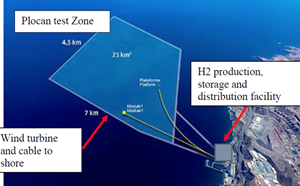News
Stargate participates in a Horizon Europe offshore wind energy project to demonstrate green H2 full value chain
Stargate H2 Solutions OÜ (Stargate) has signed a grant agreement with the European Commission under the Horizon Europe program marking a significant milestone in the company’s commitment to delivering sustainable energy solutions.
The project, coordinated by the Oceanic Platform of the Canary Islands (PLOCAN), will receive €10.7 MM for demonstrating the full value chain of green H2. The project will utilize renewable energy from a 6-MW offshore wind facility to produce green H2 using a marinized high-efficiency electrolysis unit. A 1-MW Gateway series electrolyzer from Stargate will be installed in the onshore H2 production plant at the PLOCAN site on Gran Canaria. The generated green H2 and oxygen will be used at the local hospital complex. The production of green H2 in maritime environments is still in its technological infancy, with only a handful of demonstration projects ongoing in Europe.
Stargate will be granted €3 MM which covers the delivery and installation of our novel 1-MW electrolyzer system that includes Stargate Stellar series stacks as well as H2/O2 compression and storage equipment.
“Stargate looks forward to delivering our Gateway series electrolyzer specifically developed for maritime applications. Being part of this important demonstration project brings Stargate to the technological forefront of the rapidly developing field of maritime electrolysis, paving the way for future on-shore and off-shore installations,” said Stargate CTO, Rainer Küngas.
In addition to Stargate, the project consortium includes the following partners: ESTEYCO, NeoDyne, 2G Solutions, ICoRSA, CMC, SCS, GOBCAN, SPLP and EMEC as an associated partner. The consortium is dedicated to engaging related stakeholders and developing replicable models for the future commercial use of green H2 that could be adopted more widely, (e.g., on the other Canary Islands as well in other maritime locations). This project is part of the Zer0 Net Emissions 2030 Health Strategy, specifically focusing on sustainable projects of strategic importance.
The project will start on September 1, 2023, and last for 5 years. The total budget is € 13M of which €10.7MM will be covered by the European Union.


